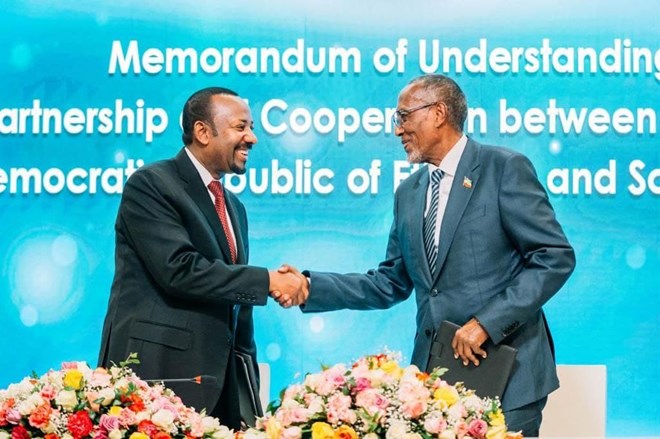Sunday January 14, 2024
By Guled Kassim

Somaliland President Muse Bihi Abdi, right, and Ethiopia’s Prime Minister Abiy Ahmed attend the signing of the Memorandum of Understanding that allows Ethiopia to use a Somaliland port, in Addis Ababa, Ethiopia, Jan. 1, 2024. Image: Prime Minister Abiy Ahmed/X
Somaliland's recent efforts to attract foreign investments for infrastructure development, job creation, and increased government revenues are commendable and ambitious. The pursuit of foreign capital holds significant promise for regional economic growth, offering job opportunities and improving citizens' well-being. Recognizing Somaliland's reliance on generated revenues for government funding and military maintenance underscores the government's commitment to sustaining stability and prosperity. This dedication is particularly noteworthy considering the challenging circumstances faced by Somaliland in 2023, including economic dimensions and political, diplomatic, and security setbacks stemming from the emergence of SSC/Khatumo state.
However, the recent disclosure of a contentious Memorandum of Understanding (MoU) between Ethiopia and Somaliland on January 1, 2024, aiming to make a bold political decision at the beginning of the new year, has ignited tensions in the Horn of Africa, generating more concerns than hopes. Under this agreement, Ethiopia gains access to 20 kilometers of Somaliland's coastline near Lughaya, northwest of Saylac, with Somaliland envisioning Ethiopia as the first UN member state to recognize its independence.
The agreement has encountered strong objections from the Federal Government of Somalia, denouncing it as an "act of aggression" and a "clear violation" of its sovereignty. In response, Somalia swiftly recalled its ambassador to Ethiopia. It sought international support by appealing to organizations such as the United Nations Security Council and other regional organizations such as the African Union, the Intergovernmental Authority on Development IGAD, the Organization of Islamic Cooperation, and the Arab League, of which Somalia is a member. The widespread international condemnation of the agreement attests to Somalia's goal of garnering support for condemning Ethiopia's violations and enforcing adherence to international laws. The Somali government has categorically declared the deal as "null and void with no legal basis," firmly rejecting its legitimacy.
Moreover, the Memorandum of Understanding (MOU) has triggered concerns due to its deviation from the established government processes in Somaliland. It should have undergone necessary scrutiny by the parliament or cabinet personnel to evaluate its economic viability and address potential security concerns. Similarly, the agreement needed the required examination of the Ethiopian parliament or executive branch, sidestepping customary channels for comprehensive evaluation and approval. This departure from standard procedural oversight has led to apprehensions regarding the transparency and thoroughness of the agreement's assessment. The surprised and often disconnected explanations offered by members of each government further serve as evidence of these concerns.
Drawing lessons from history, particularly in navigating challenging international diplomatic situations, the MoU, as a non-binding statement of intent, requires further negotiation and ratification by both parties. Concerns have surfaced regarding its feasibility and potential impact on regional stability due to the deal's rapid execution and secretive nature. Historical examples, such as the Sykes-Picot Agreement of 1916 and the Munich Agreement of 1938, underscore the risks associated with hastily crafted agreements involving complex issues like sovereignty and borders.
Approaching the Ethio-Somaliland MoU with caution and scrutiny, not treating it as a finalized deal, is crucial. A transparent and inclusive process is essential, respecting the rights and interests of all stakeholders while addressing potential risks and challenges. This approach can be a foundation for lasting and peaceful cooperation in the Horn of Africa.
Importantly, Ethiopia must maintain regional security and good neighborliness for port access. Viable alternatives exist, such as strengthening cooperation with existing partners or offering incentives to new ones. Ethiopia can engage more with Eritrea and Djibouti and even enter direct negotiations with the Federal Government of Somalia, negotiating equitable port usage terms based on respective interests. Like leveraging Ethiopian Airlines, Ethiopia can use its economic and diplomatic assets, such as its stake in the Great Renaissance Dam or Ethio-Telecom, to negotiate port deals with neighboring countries like Kenya and Sudan. The MOU between Somaliland and Ethiopia need not be likened to a declaration of war; however, it must follow international norms, engage the right parties, document their agreement, and involve them thoroughly throughout the process. These alternatives hold the potential to benefit Ethiopia and the entire region by promoting trade, integration, and peace.
The need for more transparency in initiating the Memorandum of Understanding (MOU) is a significant concern for the Somali people and the international community. A deal of such magnitude should not be shrouded in secrecy, prompting legitimate inquiries into transparency and accountability. By persisting with the contentious 20-kilometer access, Ethiopia jeopardizes the potential for future access to Somalia's extensive coastline spanning over 3,000 kilometers.
Guled Hussein Kassim is the Founder & Managing Director of KFT Global, an investment advisory & management firm. He is also a former Minister of Posts and Telecommunications.